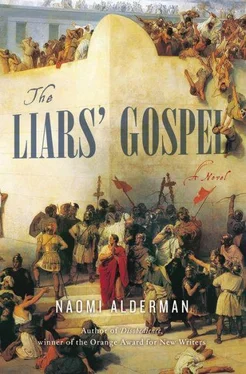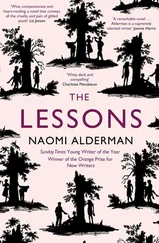“How deserted sits the city that once was full of people!
How like a widow she is, who was great among the nations.
The princess among all provinces has become a slave.”
— The Book of Lamentations
Time continued, of course. The Jews did not cease to rebel, nor did the Romans cease to smite them. The Emperor Hadrian, crushing a rebellion sixty-five years later and attempting to forestall another, renamed the city and forbade the Jews from entering it at all. His soldiers brought in new populations to Judea and chased the Jews out into other lands, to arrive in Antioch or Syria or Gaul or Kush or Rome herself and mourn their Temple and conduct their little rites of remembrance.
And in time, a new god rose in Rome. A small cult, grown slowly mighty. And although one might say: this was the triumph of the Jews, this Jew-god risen to a high place in Roman esteem, nonetheless by the time he arrived there he was no longer a Jew at all, quite the reverse in a sense.
For the new god was welcomed for one thing at least: it was evident to all that the destruction of Jerusalem must be a message from the God of the Jews. The wisest men sought for prophecies that could make the thing comprehensible. They thought of signs they had seen — perhaps a comet, perhaps a cow giving birth to a lamb. The new god, the Crucified King, provided an explanation: the Jews had angered their God by rejecting his true emissary. The people fingered their coins, rubbing their thumbs over that weeping Jewish woman, the figure of a man with his sword raised against her. It needed an explanation. If the Jews had rejected their God’s true emissary, that was why Jerusalem, one of the greatest and most famous and most prosperous and most beautiful cities on the earth, had been destroyed. Blame could not, this explanation made abundantly clear, in any way attach to Rome.
Storytellers know that every story is at least partly a lie. Every story could be told in four different ways, or forty or four thousand. Every emphasis or omission is a kind of lie, shaping a moment to make a point. So when, between thirty-five and seventy years after Yehoshuah’s death, Mark and then Matthew and then Luke the complier and then John the theologian came to tell their stories it was as well for them to exonerate the Romans, who ruled the empire they lived in, and to blame the Jews, whose wickedness had clearly caused the destruction of their holy city. It was as well for them to add in perhaps a line here or there in which Yehoshuah had predicted that the Temple would fall, that the city would fall. This made him look wiser, as it made the Jews look worse for not believing, even in the face of such clear evidence. Nothing happened without a reason.
Storytellers know that people enjoy tales that explain to them the origin of things, the way things come to be the way they are. This story is no different. Every story has an author, some teller of lies. Do not imagine that a storyteller is unaware of the effect of every word she chooses. Do not suppose for a moment that an impartial observer exists.
Once upon a time there was a man, Yehoshuah, whose name the Romans changed to Jesus, for that sat more easily on their tongues. There may well indeed have been such a man, or several men whose sayings are united under that one name. Tales accreted to him, and theories grew up around and over him. He became, like Caesar, the son of a god. Like the god Tammuz, or the god Ba’al, or like Orpheus, also the son of a god, it was said he died and rose again. Like Perseus, he was born of a woman who had never known a man. He was turned into a god and certain things were lost and certain things were added.
And when one peels away the gilding and the plaster and the paint that were applied to him, what remains? So much of what he said, he took from the Torah of the Jews. “Love your neighbor as yourself” is an old Jewish ideal. But Yehoshuah was unique, in his time and place, for saying, “Love your enemy.”
It is a dreamer’s doctrine. Visionary, astonishing. And a hard road, in times of war and occupation. If all involved had listened to those words, matters would have fallen out quite differently. And if those who claimed to follow him later had dedicated themselves to that one thing—“Love your enemy”—much bloodshed might have been avoided. But perhaps the idea was too difficult, for it is not much observed, even to this day. Easier to prefer one’s friend to one’s enemy. Easier to destroy than to build or to keep a thing standing.
And so the Temple burned. The walls of Jerusalem fell. The people were scattered into exile in ten lands and ten times ten. And they took with them their unusual stubbornness and their distinct ways. And a book walked those same paths, from synagogue to synagogue at first, telling a tale of how miraculous one man had been and how evil those who rejected him were, and therefore bringing good news for some and bad for others.
This was how it ended. And all the sorrow that came after followed from this.
This is, of course, a work of fiction. Much of it is made up, especially the personal lives of public figures, which tend not to be recorded. However, many of the most surprising parts of this book are based in fact. So, a few brief notes on some of the things that are true. Insofar as we know what is true. My main sources have been the works of Josephus, the Talmud and the Gospels themselves.
Miryam
“When his family heard about it, they went out to lay hold on him, for they said: ‘He is out of his mind.’” —Gospel of Mark 3:21
“Then his mother and brothers came to see him and, standing outside, sent someone in to call him.…And he answered them saying, ‘Who is my mother, or my brothers?’ And he looked about on those who sat around him and said, ‘These are my mother and brothers!’” —Gospel of Mark 3:31–35
Josephus, Antiquities of the Jews, XVII, 10, contains an account of the rebellion at the festival of Shavuot (The Feast of Weeks, or Pentecost) in around 4 BCE, along with the result: “The number of those that were crucified on this account was two thousand.”
Iehuda from Qeriot
“A follower said to him: ‘Lord, let me first go and bury my father.’ But Jesus said to him: ‘Follow me, and let the dead bury their dead.’” —Gospel of Matthew 8:21–22
“And in Bethany, in the house of Simon the leper, as he sat at table there came a woman with an alabaster flask of pure spikenard, very precious. And she broke the flask and poured it on his head. And some disciples were angry and said, ‘Why waste this perfume? It could have been sold for a very high price and the money given to the poor.’…Then Judas Iscariot, one of the twelve apostles, went to the priests to betray him.” —Gospel of Mark 14:3–10
Caiaphas
“Seven days before Yom Kippur [the Day of Atonement] we sequester the High Priest from his house…we even make sure there’s another wife for him, because what would happen if his own wife died?” —Talmud Yoma 1, 1
“And the priest shall write these curses in a scroll, and he shall wash them out in the bitter waters. And he shall make the woman drink the bitter waters that cause the curse.” —Numbers 5:23–24 (the whole ritual is recounted in Numbers 5 throughout)
The massacre in the square by plainclothes soldiers is recounted in Josephus, The Jewish War, II, 9.
Bar-Avo
Sicarii mingle with the crowd and kill people with daggers concealed in their cloaks in Josephus, The Jewish War, II, 13.
Epilogue
“[Titus’s soldiers] caught every day five hundred Jews; some days they caught more…they nailed those they caught, one in one way and another in a different way, to the crosses for a joke. Their multitude was so great that there was no room for all the crosses.” —Josephus, The Jewish War, V, 11 (Titus’s speech here is also largely taken from Josephus)
Читать дальше












